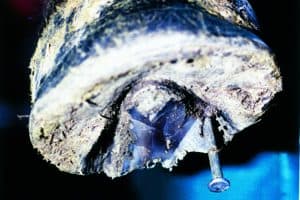Latest News – The Horse

Joint/Foot Lameness in Horses (AAEP 2010)
Alcohol joint fusion, cryotherapy techniques for laminitis, sidebone fractures, and many more joint/foot lameness topics were discussed at the 2010 American Association of Equine Practitioners convention joint/foot session.
Champion Racehorse War Pass Dies
Champion racehorse War Pass died Dec. 24 at William S. Farish’s Lane’s End Farm near Versailles, Ky. The 5-year-old stallion had just arrived the evening before in good order from standing his second Southern Hemisphere season at Widden Stud in Australia. The morning of his death, War Pass showed no signs of illness or injury. He was turned out in his paddock and died several hours later.
Texas Humane Group Gets Custody of Rescued Herd
More than 40 allegedly maltreated Quarter Horses–including foals, yearlings, and several pregnant mares–remain under rehabilitative care after being placed in the custody of the Society for the Prevention of Cruelty of Animals (SPCA) of East Texas.
Judge Denies Motion to Dismiss Pryor Mustang Herd Case
A federal court judge sided with wild horse advocates earlier this month when he declined to dismiss their lawsuit opposing a U.S. Forest Service (USFS) plan to construct a fence at the Custer National Forest, which spans from South Dakota to Montana. The fence would border the Pryor Mountain Wild Horse Range, located near Lovell, Wyo.
Iceland Horse Respiratory Disease Quarantine Lifted
According to a report filed by the New Zealand-based website Horsetalk, Icelandic authorities will discontinue export quarantine protocol for an upper respiratory tract infection that plagued the island nation earlier in 2010. According to the Icelandic Food and Veterinary Authority (MAST), authorities halted the export of horses from Iceland from May 1 to Sept. 14 to prevent the spread of the
XY Sex Reversal in Horses: The Genes Behind the Switch
Veterinary researchers have taken a leap forward in explaining XY sex reversal, the most common equine sex chromosome abnormality. A team of scientists from the University of Kentucky’s Gluck Equine Research Center and the College of Veterinary Science at Texas A&M University have been examining the Y chromosome to determine what prompts a genetic mutation that causes seemingly healthy mares
Feeding the Starved Horse
When dealing with a starved horse, how should you feed him? How much should you feed, how often, and what type of feed will bring the horse back to good health without causing more problems? The starved horse is in a most delicate health predicament, and returning it to health requires using proper refeeding protocols. However, a starved horse should undergo a thorough veterinary examinatio
Ask the Vet LIVE: Feeding Foals and Young Horses Recording Now Available
TheHorse.com’s Ask the Vet LIVE session on Feeding Foals and Young Horses, held on Dec. 15, is now available for listening on demand. Questions about developmental orthopedic disease in horses, grains, forages, supplements, breed differences, and more were answered by veterinarians Sarah L. Ralston, VMD, PhD, Dipl. ACVN, and Kenneth Kopp, DVM.
Flehmen Response in Horses
Flehmen is the term used to describe the behavior in which a horse extends its neck, raises its head, and inhales as it rolls its upper lip back, displaying its front teeth. Sharon Crowell-Davis, DVM, PhD, Dipl. ACVB explains that horses display the flehmen response to facilitate transfer of inhaled scent molecules (pheromones and possibly some other substances) into the vomeronasal organ (VNO)
Genetic Mutation Caused Nonhereditary White Coat Color Pattern
Researchers recently discovered a new genetic mutation in a Thoroughbred foal that was born with large portions of nonpigmented skin. Whether another horse with the the same rare mutation will be born is unknown, but the discovery has fueled researchers’ pursuit of knowledge about coat color-related genetics and its potential relationship to serious health problems or death.
Retailers Increase Partnership with Animal Supplement Council
Leading retailers that sell animal health supplements are partnering with National Animal Supplement Council (NASC) to reduce incidences of regulatory action and to provide consumers with guidance on purchasing reputable products for animals.
Merry Christmas from The Horse
The holiday season is once again upon us! Here at our home office in Lexington, Ky., we are fortunate enough to be celebrating a white Christmas this year. Today, we are spending the day with our families (both two- and four-legged!), and we hope you are doing the same. Our goal all year long is the bring you the latest and most informative horse health care information, and we sincerely appreciat
Heart Problems in Horses
The circulatory system (heart and blood vessels) and respiratory system (lungs and airway) work together to provide oxygen throughout the horse’s body, and to transport waste material from the horse’s tissues. During exercise, the circulatory and respiratory systems are the mechanisms that allow the horse’s musculoskeletal system (bones, connective tissue, muscles) to produce motion from energy.
UC Davis to Host “Hoof Management in Sport Horses” Lecture
The 2011 Charles Heumphreus Memorial Lecture will take place on Jan. 29, 2011, at the University of California, Davis, School of Veterinary Medicine. Michael Ross, DVM, Dipl. ACVS, and Patrick Reilly, farrier, both from the New Bolton Center of the University of Pennsylvania School of Veterinary Medicine, have been invited as featured speakers to discuss “Hoof Management in Sport Horses.”
New Propofol Controls: AVMA Offers Important Guidance
The American Veterinary Medical Association (AVMA) has offered input to help smooth implementation of proposed new federal guidelines on a useful and effective induction agent, propofol. The Drug Enforcement Agency (DEA) has proposed making propofol a Schedule IV drug (drugs that have a safe and accepted medical use in the United States, including those certain narcotic and non-narcotic drugs,
Neuroaxonal Dystrophy in Horses
Neuroaxonal dystrophy (NAD) is a degenerative central nervous system disease of horses, humans, and other animals. Horses affected with NAD usually appear dull or depressed with weakness and mild to severe gait abnormalities (ataxia) that affect all four limbs, although the hind limbs are usually more severely affected. Clinical signs of NAD are usually first observed in young horses under the











